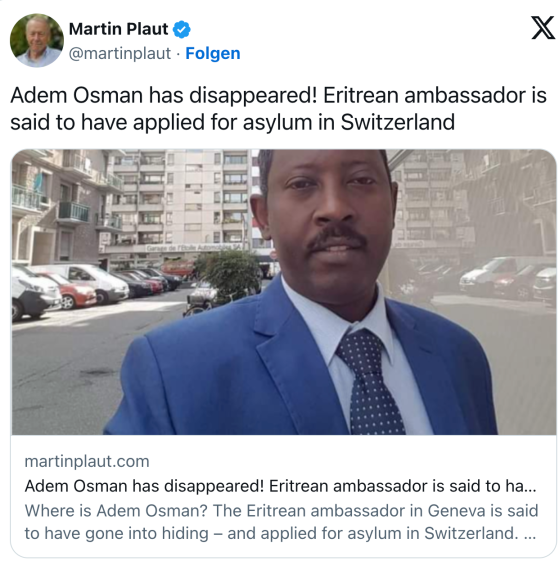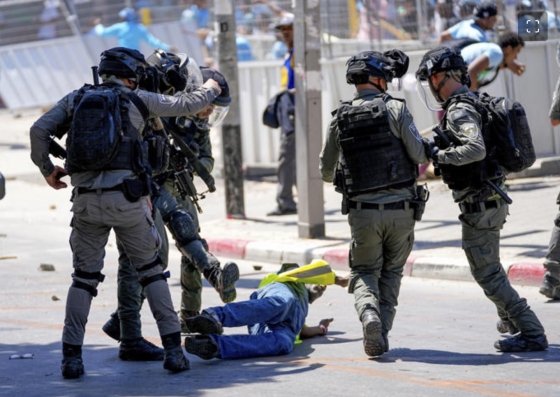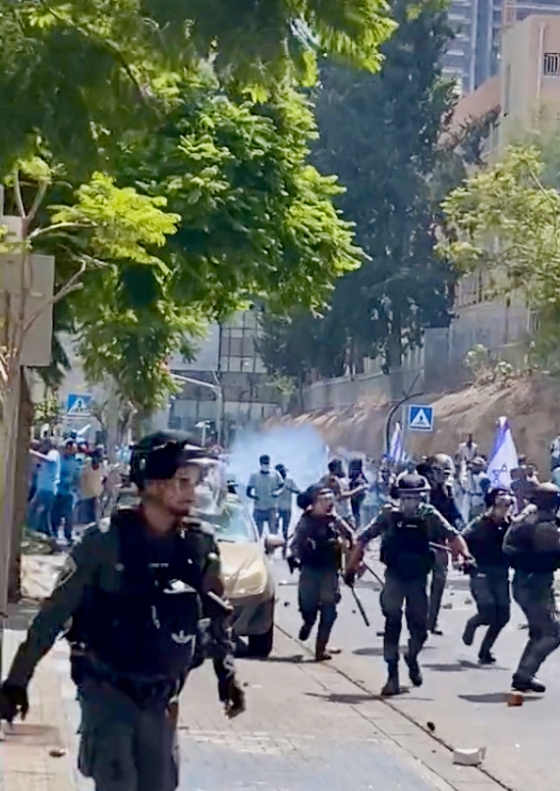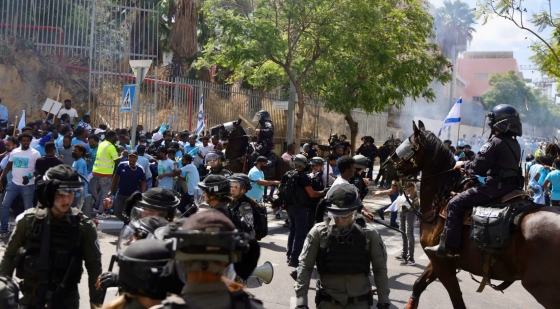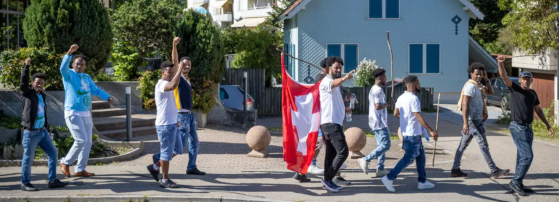Eritrea’s missing Swiss Ambassador tracked down
Sunday, 10 September 2023 21:53 Written by Martin Plaut
The "NZZ am Sonntag" has tracked down the Eritrean ambassador in Geneva who has allegedly disappeared and gone into hiding. The regime's lack of transparency and dubious information policy repeatedly lead to false reports and rumours. Source: NZZ Magazine Eritrea - a dictatorship of rumoursGeorg Humbel How can this be? Various newspapers reported this week that Adem Osman had left the embassy and disappeared. An Eritrean radio station in exile was the first to broadcast the news. Adem Osman is an internationally known figurehead of the regime in Asmara. He has appeared before the UN several times. This makes the news that he has virtually deserted all the more spectacular. The news spread like wildfire in the Eritrean exile community. Bloggers and later Swiss media jumped on the bandwagon and spread the news. Adem Osman has disappeared! Eritrean ambassador is said to have applied for asylum in Switzerland Wild stories immediately started to circulate among the Eritreans: Osman had taken a well-paid job at the UN, was one version. Quite wrong, others said: He had applied for asylum and was now living anonymously in a refugee centre in Ticino. Or a third version: Osman had fallen out with the regime. He had to go into hiding and was fleeing in panic. Osman is still ambassadorObviously, he is not. He is standing on the pavement in Geneva's Paquis district at midday on Friday, talking to this newspaper's reporter in a relaxed manner. "I am still working at the embassy," Osman says. Nothing has changed, everything is normal, the Eritrean diplomat emphasises. There is not enough time for a selfie, Osman says a friendly goodbye and continues walking with his companion towards Lake Geneva. It is not the first time that there are rumours around the Eritrean embassy in Geneva. What exactly is happening on Rue de Lausanne? Is the embassy collecting funds? Is it spying on the diaspora in Switzerland? Such questions pop up again and again. The fact that they remain unanswered is due to Eritrea's information policy. The embassy hardly talks to the Swiss media. Telephone calls are pointless, they always lead nowhere. Enquiries by e-mail remain unanswered. The embassy is thus following in the best tradition of the regime in Asmara. Government action in the East African country is highly non-transparent. There is no valid constitution. There are written laws - but they only apply to a limited extent. Unwritten guidelines are just as important. There is a permanent state of uncertainty. Political scientist Mirjam van Reisen does research on Eritrea at Tilburg University in the Netherlands. She is considered one of the best experts on the country. She says: "There are always a lot of rumours in Eritrea. No one knows anything for sure, so everyone is speculating." This is typical of a non-transparent dictatorship. The whole thing is fuelled by the fact that Eritrea is a strongly oral society and there is a tradition of drinking coffee and talking. This leads to rumours spreading extremely quickly. For example, rumours about the health of the autocrat Afewerki are constantly circulating. Sometimes he is deathly ill and close to his deathbed, then again he is in the best of health. Disinformation as a strategyVan Reisen, however, goes one step further. "The regime is deliberately using a strategy of disinformation," says the professor. The government is working to construct a "grey area". It is definitely in the regime's interest that it remains unclear what is true and what is false. "Even rumours and false reports have an impact if they are spread long enough," van Reisen says. This grey area surrounds Eritrea as a whole. Since refugee numbers from the East African country skyrocketed in 2006, Federal Berne has been puzzling over how bad the situation in the country really is. Refugees describe the country as hell on earth. As a kind of "North Korea of Africa". Bourgeois asylum politicians have long suspected that the situation in the country is not so bad. Which is true? As always in the case of Eritrea, it is difficult to find out. The country is isolated, and hardly any reliable information gets out - but all the more rumours. |
Eritrea’s Diplomatic Missions are Instruments of Extortion and Intimidation
Saturday, 09 September 2023 22:00 Written by Martin Plaut
|
Tel Aviv Riots Put Spotlight on Israel’s Covert Ties With Eritrea’s Dictator
Saturday, 09 September 2023 21:40 Written by Martin Plaut
|
Israel: Many injuries, some life-threatening, after Eritrean democracy activists clash with Eritrean supporters of President Isaias
Saturday, 09 September 2023 21:30 Written by Martin Plaut
Around 90 Eritreans have been wounded, with at least 4 in a serious condition, in hospitals in Tel Aviv, following a clash between supporters and opponents of the Eritrean government. These are some images of the fighting that broke out this morning, with police responding with tear gas, live ammunition and brute force. The Israeli authorities were warned a week ago by pro-democracy Eritreans that this would happen. Alert about a mass event that is accompanied by violent threats on social networks08/26/2023 Greetings, On Saturday 02/09/2023 the Eritrean Embassy in Israel is planning a political event, the planned event accompanied by threats from its supporters, to the same extent a demonstration of opposition is planned by those opposed to the dictatorship, Such events took place during the month of July and August around the world, such as Germany, Sweden, Great Britain, Canada and the United States, the events mentioned were stopped due to severe violence that endangered the lives of both supporters and opponents as well as civilians. In Israel there have been such bloody events in the past that got out of control took a heavy toll on people and it took us a long time for the community organizations to calm them down, now following the events around the world and the provocations of the Eritrean ambassador and his supporters the threats of escalation have returned once again and this may lead to unnecessary bloodshed. There is a threat testimony on Facebook of the organization of men of an organized squad that has only men today, Saturday 08/26/2023, which is intended to scare and threaten explicitly in preparation for the event next week. In light of the above, we, as a community organization that works for the peaceful life of the community in various fields, express our concern for real fear for human life and ask the Israel Police to act to prevent violence that endangers human life. Egon team – Eritrean New Hope Organization Chairman Berhana Nagasi Mahate Eritrean New Hope Organization |
Eritrea Festival in Oberuzwil: demonstrators arrived from all over Switzerland – organisers cancel the event
Saturday, 09 September 2023 21:28 Written by Martin Plaut
According to Marina Menzi, media spokeswoman for the St.Gallen cantonal police, the festival was canceled by the organizers: “The organizers have realized that their festival cannot be held.” Source: Tagblatt Despite warnings from the authorities, an Eritrea festival to commemorate the beginning of the War of Independence took place in Oberuzwil. Demonstrators came from all over Switzerland. The police were on duty with a large contingent. By Raphael Rohner September 2nd, 2023, 5:15 p.m An Eritrea festival was to take place in Oberuzwil on Saturday afternoon. Several dozen people from Eritrea wanted to interrupt and prevent the festival, which brought together supporters of the dictator Afewerkis. They traveled from all over Switzerland to do this. The festival's landlord tells this newspaper that he was warned by the police in advance, but decided not to do anything about the festival: "These people come every year. Nothing's going to happen." Meanwhile, the man was contacted by several Eritrean experts to urgently cancel the festival. “Now I have a strange feeling and, to be honest, I’m afraid to go and cancel the party.” According to eyewitnesses, there are several familiar faces on site. Among other things, there are also supporters of a group loyal to the regime that has made the headlines and been the focus of the authorities several times in the past because of violent excesses: “Eri Blood”. Experts consider this group to be very dangerous because it carries out criminal acts on behalf of the government and takes action against opponents of the regime all over Europe. “This group can be compared to Russia’s Wagner troops,” an expert told this newspaper. The behavior of the police caused great resentment among the people who had traveled: “Why are we being sent away while a genocide is being celebrated?” Many people didn't want to wait at the motorway exit in Uzwil, but wanted to drive to the venue anyway: “We don't believe the police that the festival is canceled! We want to see it for ourselves,” says a young woman. According to Marina Menzi, media spokeswoman for the St.Gallen cantonal police, the festival was canceled by the organizers: “The organizers have realized that their festival cannot be held.” It was only on Saturday morning that reports from Israel made headlines: At least four people were injured there during demonstrations against an Eritrean festival. |
EPDP: A Short Profile and Political Resolutions of the 4th Congress 2023
Wednesday, 23 August 2023 17:08 Written by 4 th EPDP CongressEritrea Liberty magazine Issue Nr.80
Saturday, 19 August 2023 00:00 Written by EPDP Foreing Relation AffairsThe Visionary Leadership of EPDP: A Path Towards Democracy in Eritrea
Friday, 04 August 2023 11:41 Written by Haile TinsaewFinal Statement of the 4th EPDP Congress
Monday, 31 July 2023 22:41 Written by Eritrean People’s Democratic PartyThe 4th Congress of the Eritrean People’s Democratic Party (EPDP) was successfully conducted in Wiesbaden, Germany, between 23 and 26 July, 2023 in Wiesbaden, Germany. Organized under the party slogan of “We Struggle for Constitutional Governance, Democracy and Progress”, the Congress was attended by EPDP delegates from many parts of the globe.
- Taking place at a crucial time when the situation in Eritrea is worsening by the day under the dictatorial clique of PFDJ (the so-called People’s Front for “Democracy and Justice”);
- While destructive wars are raging in our fraternal neighbors of the Sudan and Ethiopia; and
- While global actors are attempting to reshape world order by alliances,
The 4th EPDP Congress, therefore, had to discuss these developments with all the serious attention they deserved.
During the opening ceremony, warm solidarity speeches were delivered by the newly elected Coordinator of the Eritrean Political Forces (EPF) who is also the Chair of the Eritrean National Council for Democratic Change (ENCDC) and a Representative of the Global Yiakil/Enough/Kifaya Movement. Other fraternal movements, associations and media outlets that could not be present at the venue in Germany sent their heartfelt wishes for the success of the Congress.
After lengthy deliberations over the party’s Political Program, Constitution and report of the EPDP General Auditor, the Congress adopted the drafts as legal party documents. Also scrutinized and finally adopted as party documents were the lengthy four-year reports of the Chairman, reports of the other eight departments of the Executive Committee and Political Resolutions of the Congress.
On the Current Situation of Eritrea:
The 4th Congress expressed full conviction that the relation of the dictatorial regime and the Eritrean people is by now non-existent because of the total betrayal of that clique to the entire nation and to the very flimsy structures it started to establish. Therefore, the Eritrean people are urged to take matters into their own hands and reminded to rally behind this party that vows to continue being at the forefront of the struggle to remove the PFDJ and its system.
On Eritrean Sovereignty:
Encouraged by the treacherous language and policies of the tyranny in Asmara, Ethiopian quarters that never swallowed Eritrea’s attainment to statehood and those misinterpreting the right of access to the sea have lately been engaged in day-dreaming some measures that aim to affect the very unity of the Eritrean people and their sovereign state. The Congress therefore affirms that the territorial integrity of the land, sea and air, and the unity of its people are national issues that shall never be negotiated.
On Process for Joint Work at EPF and other Levels:
The 4th EPDP Congress gave full mandate to the newly elected leadership to take all what is necessary to speed up the now promising stage to agree for joint work with fraternal Eritrean Political Forces (EPF) and also to seriously work on the ongoing dialogues with various other political formations, fronts and movements.
On Mass Uprisings:
In regard to waves of current and future mass uprisings, including the ongoing popular resistance being given the name “Brigade Nhamedu,’ the Congress expressed its full backing and necessary support to such rightful measures that must be conducted within legal frameworks and without earning the dislike of host countries and peoples.
On the Eritrean Defense Forces:
The Congress condemned the unwarranted involvement of the Eritrean Defense Forces (EDF) in the recent Tigrai war although it was well known that the EDF members, themselves victims of the regime, had nothing to gain from such conflicts and invasions imposed on them and the Eritrean people. The EDF is now called upon to save itself and the people from the shackles of the regime and be on guard to resist and future involvement in wars which are likely be rekindled by the war-mongering regime.
On Eritrean Refugees:
The 4th Congress took note of the regime’s misguided policies and failure to welcome back and resettle pre-independence refugees as well as the continued waves of Eritrean refugees, and reiterated its call upon the Eritrean people to coordinate its energies to get rid of this tyrannical regime of Isaias Afeworki. The Congress also paid tribute to all counties and people that have been extending helping hands to our needy refugees.
On Eritrean-Ethiopian Relations:
The Congress reaffirmed the EPDP’s position of continuing the relations between Eritrea and Ethiopia peoples based on policies of non-interference in the internal affairs of the other and the promotion of peace and mutual interests guaranteed by transparent accords and not by those based on the whims of individual leaders. While expressing deep concern about the probability of unnecessary armed conflict between the two because of the renewed chatter over the issues of border and ‘access to the sea’, the Congress condemned PFDJ’s continued meddling to disrupt relations of forces within Ethiopia. At the same time, the Congress called upon Ethiopia to see to it that all relations in regard to Eritrea must make be centered on the Eritrean people.
On Eritrea-Sudan Relations:
Sincerely wishing the fraternal Sudanese people to succeed in their struggle to return to normalcy from the current sad situation, the 4the EPDP Congress strongly appealed on the warring military leaders to cease fighting and settle differences peacefully through dialogue. It also urged the world community to intervene in stopping this war which can severely affect the entire region.
On the Tigrai Region of Ethiopia
The people of Tigrai are not only neighbors but are a fraternal people with many shared traits with the Eritrean people. The 4th Congress, therefore, affirmed EPDP’s resolve to help in healing the wounds afflicted by the war and rebuild normal relations based on cooperation and promotion of mutual interests by fighting and failing the harmful schemes of Eritrea’s belligerent dictator, Isaias Afeworki.
On Human Rights in Eritrea:
The Congress expressed its strong wish to see soon actions being taken by those concerned to bring to full accountability the Eritrean tyrant and his accomplices for the egregious crimes they have been committing against Eritrean religious leaders, journalists and political actors in complete violation of international calls and fundamental human rights rules and norms.
Concluding its deliberations, the 4th EPDP Congress democratically elected 35 persons from among candidates submitted by the Nominating Committee to serve as Central Council members for the next four years. Other five reserve members were also elected.
The Congress also expressed deep gratitude to party members and sympathizers for their devotion and generosity in making the 4th EPDP Congress a resounding success.
Victory to the Just Struggle of the Eritrean People!!
Victory to Joint Work of Eritrean Political Formations and Movements!!
Down with the Tyrant PFDJ Regime in Eritrea!!
26 July, 2023, Wiesbaden, Germany


